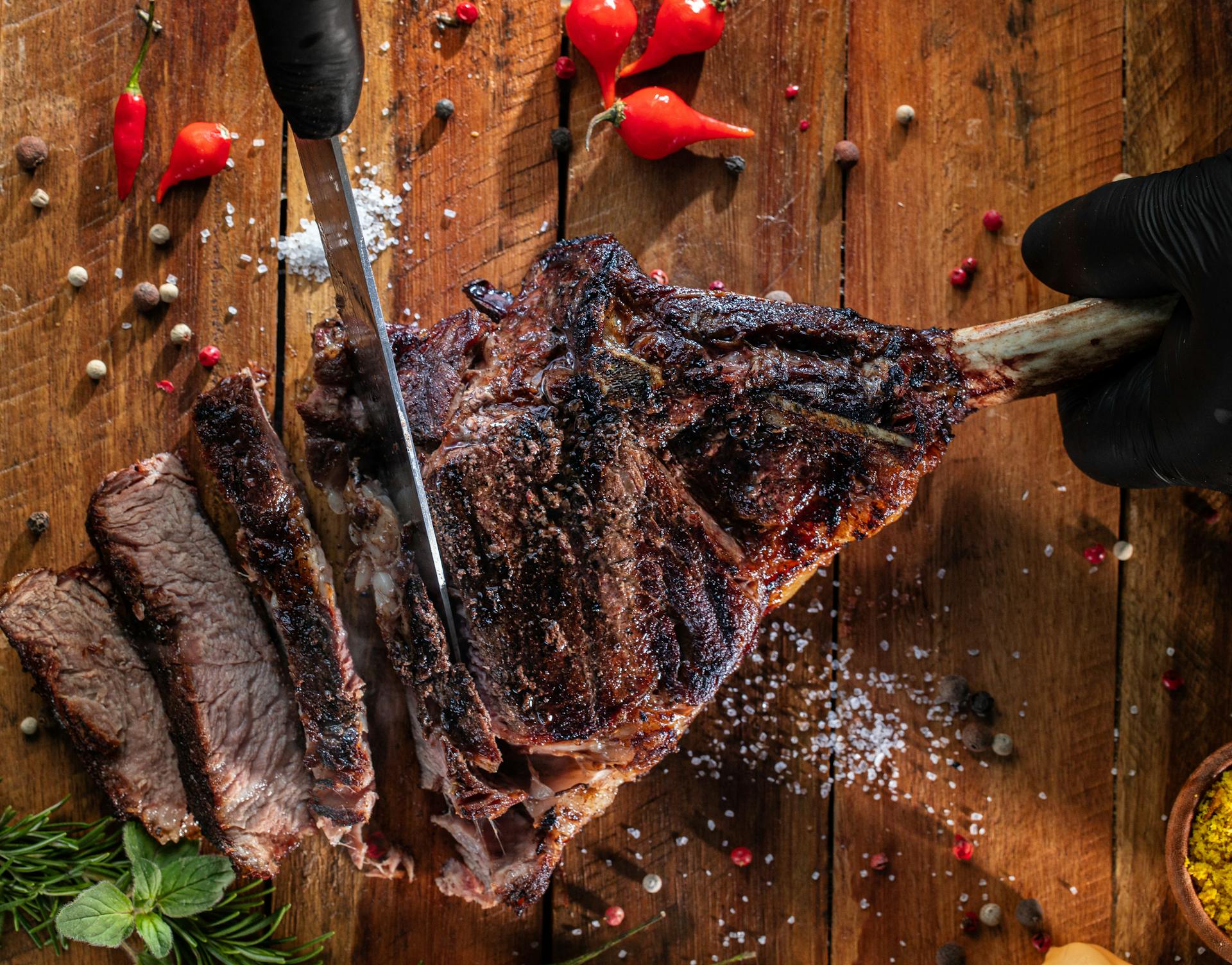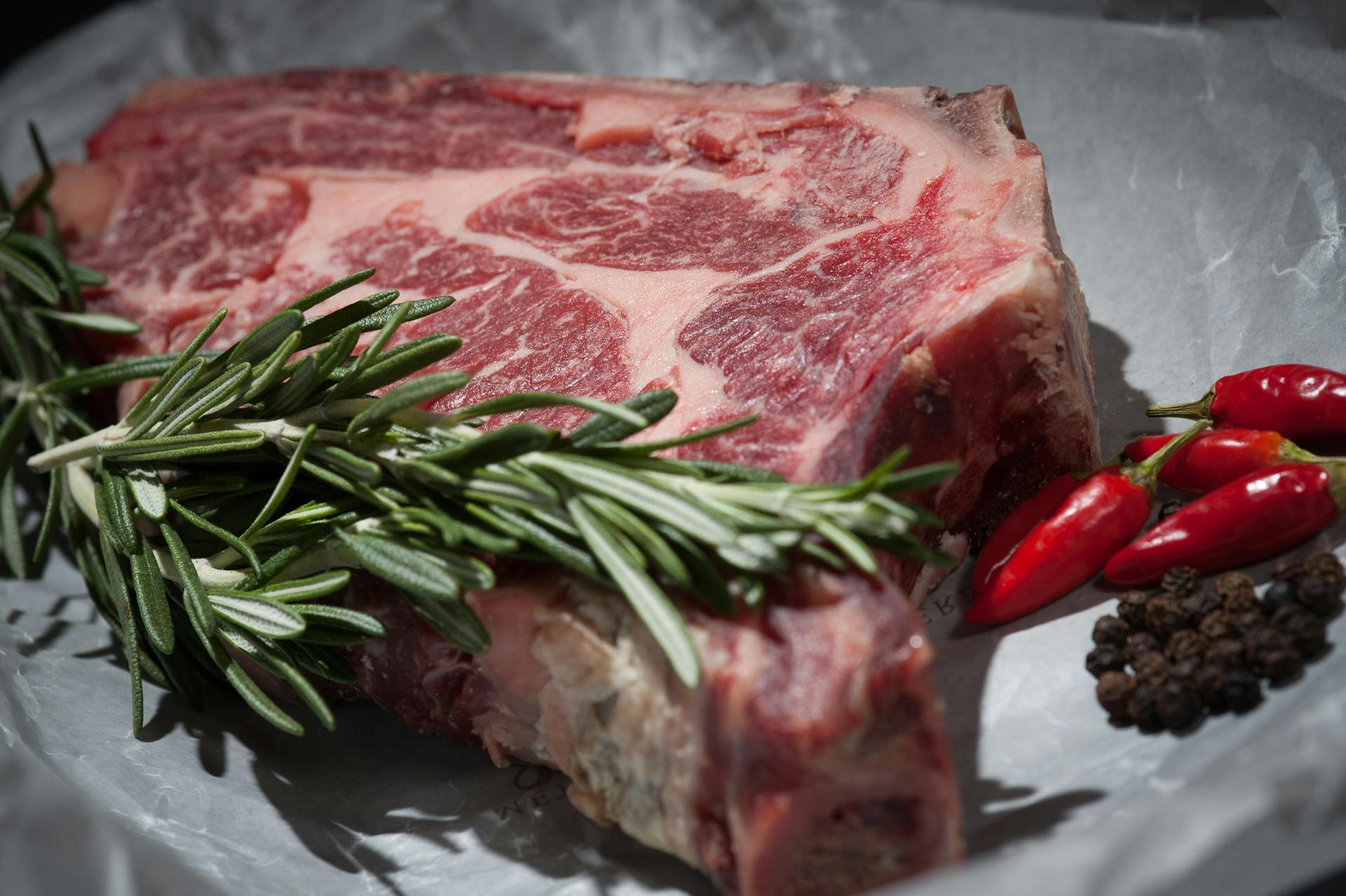
Dealing with a freezer full of rotten meat can be an unpleasant but necessary task, especially if you want to make sure that no one is exposed to health risks. While it’s important to dispose of the meat properly in order to protect yourself, your family and your environment, there are some simple steps you can take to ensure everything goes smoothly.
Firstly, it’s important that you take the necessary safety precautions before starting. Make sure you’re wearing gloves and a face mask while handling the meat; this will help protect against any bacteria or pathogens that may be present in the rotting food. Next, make sure all other stored food items are removed from the freezer as these could become contaminated by cross-contamination – once they have been taken out of the freezer they must also be disposed of safely.
Once all safety precautions have been taken, get started on disposing of the rotten meat itself. One option is to double-wrap each piece directly into two separate plastic bags and discard them into a sealed lid bin straight away; this will both minimize any smells and prevent wildlife from getting access to toxic contamination from inside each bag if tossed into an outdoor trashcan. Another method is for larger pieces of frozen rotten meats: put them inside several layers of plastic bags and then break it apart further into smaller pieces before placing them into one single bakery-sized box for disposal – this minimizes possible contamination spills into your household garbage bins too!
For extra caution, either way you choose to dispose off rotting frozen meat should always go straightaway straight onto a regular garbage collection cycle day – this helps avoid other potential hazards such as pests or scavenging wild animals coming nearby looking for food sources around those bins too. Once finished disposing off these individual bags or boxes filled up with old frozen meats properly during disposal times: do remember also wash down both exterior surfaces/interiors afterwards wherever any contact had occurred (this includes cleaning thoroughly around inside each nostril too!) during handling (such as drawer pulls/small spaces) using hot soapy water mixed together in 1 part bleach 3 parts solution ratio, rinsing & wiping completely dry with fresh dishcloths thereafter ready for next usage again soon!
How do I safely discard a large quantity of spoiled meat?
Discarding large amounts of spoiled meat can be a tricky task, especially when it comes to making sure that you are doing it safely. First and foremost, it’s important to make sure any and all spoiled meat is placed in a secured heavy-duty plastic or plastic-lined garbage bag for safe disposal. Once the bag is sealed properly, place the bag in an outdoor or commercial trash receptacle with a lid that securely closes. If you are disposing of large quantities of meat, keep several layers of bags between each layer of meat so that bacteria from contaminating the surfaces around your home or business.
In addition to securely wrapping up and packaging the spoiled food, there are special methods needed to transport large quantities of raw animal proteins such as uneaten beef, pork and poultry products safely. Discard all raw proteins in a recyclable container such as plastic gallon jugs or steel drums with tight lids before placing them into an area where they can be collected and taken away by professional waste management teams according to state regulations on biohazardous waste removal laws.
By following these steps when discarding large amounts of spoiled meats, you’re ensuring not only hygienic practices but safety for yourself and those around you too!
Discover more: Pregnant Dogs Eat Raw Meat
What is the best way to get rid of a freezer full of spoiled food?
Getting rid of a freezer full of spoiled food can be a challenging task. Fortunately, there are several things you can do to make this process easier and ensure the food doesn’t spread contamination or cause any health risks.
The first step is to make sure that you have a plan for disposal so that the spoiled food won’t negatively affect anyone else in your household or neighborhood. The best way to do this is by checking local laws about disposing of large amounts of spoiled food and obeying those regulations. You may need to contact your local waste management department for specific disposal guidelines in your area.
Once you have established the proper steps for disposing of the spoiled food, begin unloading it from the freezer carefully into sealed garbage bags and disposing of it in an appropriate manner, such as dumping it in an approved landfill or compost pile. Make sure you also clean out any remaining residue inside with hot water and disinfectants before moving on to what's next. If you have non-food items like wrappers and containers, place those items into a separate bag and recycle them according to their specific instructions if they're recyclable (check with your local recycling center.). Make sure not to mix non-food items with actual edible products as these will end up needing disposal at different locations!
Once all the bad stuff is gone from your freezers, give them one last good cleanse both inside & outside using soap & ammonia solution then rinse thoroughly afterwards & dry well with cloth before returning any newly bought groceries back into them (or just operate empty if needed). Doing this will help get rid of any lingering bacteria which could result in more spoilage further down line – resulting in less time wasted fending off unpleasant odors! Finally finish off by regularly cleaning out now empty freezers; monthly basis should work just fine - remove drawers/baskets as well giving each wipe down while void - reinstall after drying well; along with regular inspection appliance gaskets too avoid air leaks/condensation buildup between use periods (if applicable). If all these steps are followed correctly then you should have no problems ensuring that all future edibles stored within remain safe & enjoyably!
How should I dispose of meat that has gone bad?
If you have recently discovered that the meat you purchased has gone bad, it’s important to dispose of it properly. The improper disposal of meat can pose a health hazard to humans and animals. Here are some suggestions for correctly discarding spoiled meat:
1. Simply throw the meat away in an outside garbage bin, making sure to keep it tightly wrapped (or in a sealed container) so that animals aren’t attracted to the smell.
2. Composting can be another option when disposing of spoiled meat, as long as your compost pile doesn’t attract wildlife or stray cats and dogs that might try to get into your garbage and consume the food). Place a layer of soil over the meat before you add additional layers to complete your compost pile — this will ensure no smell escapes and discourage animals from digging into it.
3. Finally, if there’s no possibility of attracting wildlife or scavenging animals by throwing away or burying the contaminated food, then double-bagging it before placing it in an outside trashcan is recommended —this will help prevent bacteria escaping into other areas or being spread by wind gusts throughout your home environment.. Once safely disposed of - thoroughly wash any surfaces that may have come into contact with these items prior placing them in bagging/bins for disposal - such as kitchen benches and utensils used etc… This will also help minimise any further contamination risk associated with poor handling/disposal practices..
On a similar theme: Dishwasher Smell
How can I dispose of freezer meat that has spoiled?
If you’ve got meat in your freezer that has gone bad, it can be frustrating trying to figure out the best way to get rid of it. Getting rid of spoiled freezer meat isn’t simply a matter of throwing it out with your regular weekly trash. There are specific steps you need to take in order to make sure the bad meat doesn’t contaminate other food or cause an unpleasant odor. Here are a few tips on how to properly dispose of spoiled freezer meat:
1) If you catch the affected frozen meat early enough, thawing and cooking it might be an option. This will ensure all bacteria from the spoilage is killed during the cooking process, and make it safe for consumption. However if there are any signs that discoloration or mold have already started setting in, then this step is not recommended as eating spoiled foods can lead to serious health risks like food poisoning.
2) Ensure that any packaging contaminants like wrappers or plastic bags used for freezing are completely sealed before disposal in order to avoid contamination with other items like vegetables or fruits stored inside your refrigerator. You should also double bag them before disposing them off into a garbage bin outside your home preferably with tight fitting lids so smells don't linger around inside your house compound
3) When packing up these expired frozen meats prior disposing,be sure not leave them near other edibles as they could contaminate those items and make them consumable either. Take caution that is smells don't linger around too long inside the fridge while still being packed and disposed off.
4) Dispose properly by wrapping contaminated products securely in several layers of newspaper or paper towels before throwing into an outside waste receptacle such as a large garbage bin/dumpster away from edible items.
Following these steps will help ensure proper disposal of spoiled freezer meats so that no nasty odors linger and no new risks are introduced for yourself or family members due contamination caused by improper handling and disposal methods talked about above.
How can I properly get rid of freezer food that has gone bad?
When it comes to freezer food that has gone bad, improper disposal can lead to both a mess and potential health risks. Here are four simple steps for how to properly get rid of freezer food that has gone bad:
1. Throw It Away Immediately - Freezer food that has gone bad should never be eaten as it could make you sick. The first step is to throw away the affected food immediately in an outdoor trash receptacle or similar container with a lid so it cannot be accessed by pets or wildlife. Make sure all packaging, including any absorbent material, is thrown away with the expired food product so there is no chance of transferral of germs into the environment.
2. Clean and Sanitize - After discarding the spoiled food, take measures to clean and sanitize your refrigerator or freezer as soon as possible (within 24 hours). This will help prevent bacteria growth on any remaining surfaces and also eliminate unwanted odors caused by spoiled foods still lingering in your appliance’s air space. Use warm soapy water along with disinfectant wipes/spray and thoroughly scrub down all shelves and drawers from top-to-bottom before drying off surfaces with a clean paper towel when finished cleaning up.
3.Check for Spoilage Elsewhere - Once your main refrigerator/freezer area has been cleaned thoroughly, check other items surrounding the compartment for signs of spoilage such as foul smells due to slime residue from thawed foods getting onto cookware nearby; look underneath other shelving units too since liquids tend to drip down into lower spaces when melting occurs during defrosting cycles inside your fridge/freezer area over time without regular cleaning maintenance habits being performed periodically (weekly/bi-weekly).
4.Prevention Is Key - Lastly now that you have gotten rid of spoilt freezer foods correctly and sanitized areas where these items were stored, try avoid this situation happening again in the future through planning ahead like taking inventory lists whenever shopping trips occur; record expiration dates on items if they do not already list one above its labeling which can save time during different occasions where searching frantically is avoided while looking through numerous compartments checking expiration dates on products if they don't already show one everytime drawer pulls are opened inside appliance storage units at home! This can prove especially beneficial once freezing/thawing periods happen either intentionally or unintentionally during weather shifts throughout seasons year round for individuals who fail perform regular defrosting cycles themselves manually indoors near their coldest appliances!
See what others are reading: Expiration Date
What is the best way to safely get rid of rotten meat from my freezer?
When it comes to getting rid of rotten meat from the freezer, safety should be your top priority. Rotten meat can spread diseases and harmful bacteria such as Salmonella and E. coli, which can make you or anyone else who eats it seriously ill. It is important to take some extra precautions when disposing of the rotten meat so that it does not contaminate other food items in your kitchen or make someone else sick.
The best way to safely get rid of rotten meat from the freezer is by double-bagging it in airtight plastic bags before disposing of it outside in an animal-proof trash can. This will keep the smell contained and prevent any animals or insects from getting into the bag and possibly causing harm to anyone who might eat them later on because they are contaminated with bacteria from the rotting meat. Additionally, if you have a compost pile in your backyard, you could put the bagged up rotten meat there as well – although do not consume anything that has been composted with raw meats!
It is also important to thoroughly clean any surfaces that come into contact with spoiled food such as cutting boards, knives and containers used for storing raw meats prior to using them for other foods or purposes. By taking these extra steps, you can help ensure everyone's safety when disposing off bad food items!
Readers also liked: Meat Raw
Sources
- https://www.biocidesystems.com/blogs/news/how-to-remove-rotten-meat-smell-or-odor-from-the-refrigerator
- https://www.askaboutmoney.com/threads/correctly-dispose-of-rotten-food-freezer-broken.115408/
- https://www.disposeofthings.com/dispose-of-freezer-full-of-rotten-meat/
- https://zero-meaning.com/qa/how-do-you-dispose-of-a-freezer-with-rotten-meat.html
- https://junkitportland.com/freezer-disposal/
- https://foodguidepro.com/how-to-get-rid-of-rotten-meat-smell-in-car/
- https://www.huffpost.com/entry/how-to-eliminate-freezer-odor_n_1695913
- https://knowledgeburrow.com/how-do-you-dispose-of-spoiled-raw-meat/
- https://utopia.org/guide/composting-meat-how-to-dispose-of-meat-scraps-and-bones/
- https://nerdscents.com/how-to-get-rid-of-rotten-meat-smell-in-the-car/
- https://odormd.com/how-to-remove-spoiled-food-odor-from-freezer/
- https://www.pestkeen.com/why-is-my-freezer-full-of-gnats/
- https://www.hunker.com/13420323/how-to-get-rid-of-rotten-meat-odor
Featured Images: pexels.com


